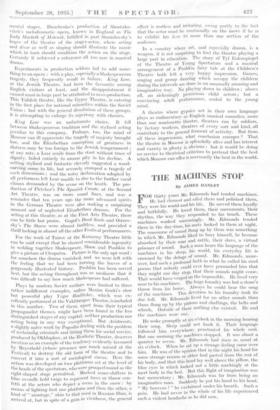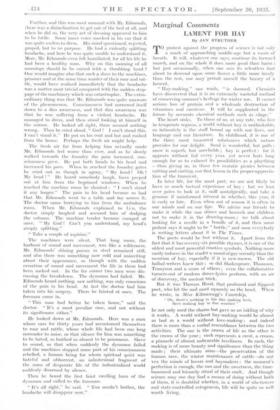THE MACHINES STOP
By JAMES HANLEY FOR thirty years Mr. Edmonds had tended machines. He had cleaned and oiled them and polished them. They were his world and his life. He served them loyally and faithfully. He loved them, their movements, their rhythm, the way they responded to his touch. These machines worked unceasingly. Mr. Edmonds tended them in the day-time, his mate looked to them at night. The concourse of sound flung up by them was something in which Mr. Edmonds liked to bury himself, he became absorbed by their roar and rattle, their slave, a virtual prisoner of sound. Such a man hears the language of the machines in his sleep, his world, his everyday life is crowned by the deluge of sound. Mr. Edmonds, more- over, had such a profound faith in what he called his steel poems that nobody could ever have persuaded him that they might one day stop, that their sounds might cease. That would have verged on the impossible. He lived very near to his machines. The huge foundry was but a stone's throw from his home. Always he could hear the song of the machines. This devotion to his foundry took its due toll. Mr. Edmonds lived for no other sounds than those flung .up by the pistons and shaftings, the belts and wheels. Outside of these nothing else existed. He and the machines were one.
He woke promptly at six o'clock in the morning hearing their song. Sleep could not hush it. Their language followed him everywhere, penetrated his whole, soul. But one morning the machines stopped. It was about a quarter to seven. Mr. Edmonds had risen as usual at six o'clock. When he sat up a strange feeling came over him. He was of the opinion that in the night his head for some strange reason or other had parted from the rest of his body, and that this head lay well above the pillow, the blue eyes in which looked not a little mockingly at the inert body in the bed. But this flight of imagination was but momentary ; Mr. Edmonds was far from being an imaginative man. Suddenly he put his hand to his head. " My heavens ! " he exclaimed under his breath. Such a pain. He had never in the whole of his life experienced such a violent headache as he did now. Further, and this was most unusual with Mr. Edmonds, there was a disinclination to get out of the bed at all, and when he did so, the very act of dressing appeared to him to be futile. Some inner voice mocked in his ear that it was quite useless to dress. His mind questioned, rejected, groped, but to no purpose. He had a violently splitting headache, and here he was quite unable to understand it. More, Mr. Edmonds even felt humiliated, for all his life he had been a healthy man. Why on this morning of all mornings should he be.'cursed with 'a throbbing head ? One. Would imagine alSo that such a slave to the machines, prisoner and at the same time warder of their roar and rat- tle, would have realised immediately that the headache was a matter most trivial compared with the sudden stop- page of the machinery which was catastrophic. The extra- ordinary thing was that Mr. Edmonds was quite unaware of the phenomenon. Consciousness had narrowed itself 'down to a dim awareness, and that dim awareness was that he was suffering . from a violent headache. He .managed to dress, and then stood looking -tit himself in the mirror. He looked all right, there seemed nothing wrong. Then he cried aloud, " God ! I can't stand this. I can't stand it." He put on his coat and hat and rushed from the house. Perhaps the fresh air might help.
The fresh air far from helping him actually made Mr. Edmonds feel worse than ever, and as he slowly -walked towards the foundry the pain increased, con- sciousness grew. He put both hands to his head and increased his pace. When he reached the foundry gates he cried out as though in agony, " My head I Oh ! My head ! " He heard somebody laugh, faces peeped out at him from the begrimed windows. When he reached the machine room he shouted : " I can't stand it any longer." The pain in his head became so bad that Mr. Edmonds went to a table and lay across it. The doctor came hurrying to him from the ambulance room. When Mr. Edmonds explained . to hi n, the doctor simply laughed and accused him of dodging the column. The machine tender became enraged at once. " My God ! Can't you understand, my head's simply splitting."
" Take a couple of aspirins."
The machines were silent. That long room, the harbour of sound • and movement, was like a wilderness. Mr. Edmonds' shining poems in steel remained still, and also there was something now cold and uninviting about their appearance, as though with the sudden cessation of sound and movement the life in them had been sucked out.. In the far corner two men were dis- cussing the breakdown. The dynamos had failed. Mr. Edmonds heard nothing, saw nothing, was only conscious Of the pain in his head. At last the doctor had him taken into his surgery. There he fainted at once. The foreman came in.
" This man had better be taken home," said the doctor. " It's a most peculiar case, and not without its significance either."
He looked down at' Mr. Edmonds. Here was a man whose ears for thirty years had accustomed themselves to roar and rattle, whose whole life had been one long surrender to noise, so that silence for him was something to be hated, so loathed as almost to be poisonous. Slave to sound, so that when suddenly the dynamos failed and the machines stopped some part of his consciousness rebelled, a human being for whom spiritual quiet was hateful and abhorrent, an infinitesimal fragment of the mass of desperate life of the industrialised world suddenly disarmed by silence.
Then lie heard the first faint swelling hum of the dynamos and called to the foreman.
" It's all right," he said. " You needn't bother, the headache will disappear now."







































 Previous page
Previous page